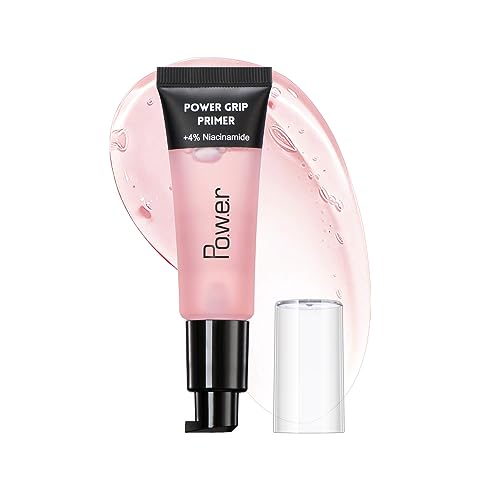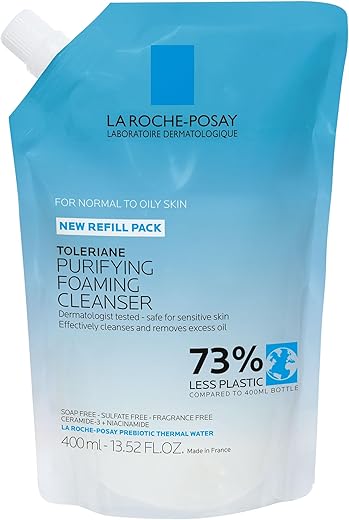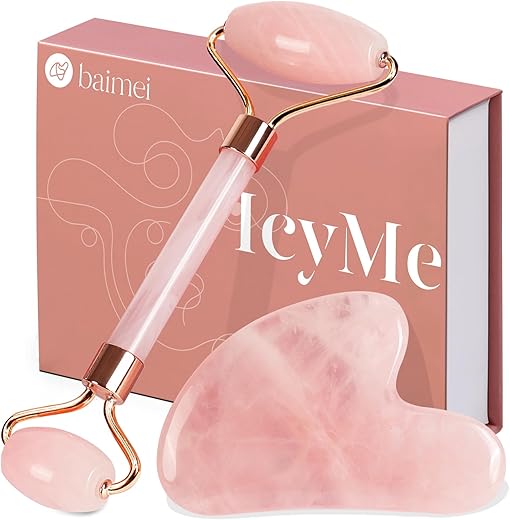
How to Select the Best Facial Primer for Sensitive Skin
Are you tired of trying numerous facial primers only to find that they irritate your sensitive skin? We understand the frustration and the struggle of finding the perfect product that won’t cause any adverse reactions. In this blog post, we will guide you through the process of selecting the best facial primer for sensitive skin. We will share useful tips and recommendations to help you achieve a flawless makeup application without any discomfort or irritation. So, let’s dive in and find the perfect primer that will nurture and protect your delicate skin.
Top-rated facial primers for flawless makeup application






Understanding Facial Primers
Are you tired of your makeup sliding off your face by midday, leaving you feeling frustrated and self-conscious? If you have sensitive skin, this struggle can be even more challenging. The good news is that facial primers can come to your rescue, providing a smooth base for makeup application while also extending its longevity. In this blog section, we will delve into the world of facial primers, explaining what they are, how they benefit sensitive skin, and why you need to incorporate them into your beauty routine.


What are Facial Primers?
Facial primers are a must-have beauty product that is designed to be applied before your foundation. They act as a barrier between your skin and makeup, creating a smooth canvas for application. Think of them as a primer you would use before painting a wall – they create an even surface for the makeup to adhere to, resulting in a flawless and long-lasting finish.
The Purpose of Facial Primers
Facial primers serve multiple purposes, making them an essential step in any makeup routine, especially for those with sensitive skin. Some of the key benefits include:
- Creating a Smooth Base: Facial primers help to minimize the appearance of pores, fine lines, and wrinkles, giving your skin a smoother and more refined texture. They fill in any imperfections, creating an even surface that allows your foundation to glide on seamlessly.
- Extending Makeup Longevity: If you find that your makeup tends to fade or melt away throughout the day, a primer can be a game-changer. By creating a barrier between your skin and makeup, primers prevent oils from breaking down your foundation, ensuring it stays put for longer periods.
- Reducing Redness and Irritation: Many facial primers are enriched with soothing ingredients like aloe vera or chamomile, which help to calm sensitive skin and reduce redness. They create a protective layer that shields your skin from potential irritants, making it an excellent choice for those with sensitive or reactive skin types.
- Hydrating and Nourishing: Some primers contain moisturizing ingredients like hyaluronic acid or glycerin, which provide an extra boost of hydration to your skin. This is particularly beneficial for those with dry or dehydrated skin, as it helps to keep your complexion looking fresh and plump throughout the day.
Choosing the Right Facial Primer for Sensitive Skin
When it comes to selecting a facial primer for sensitive skin, there are a few key factors to consider. Here are some important points to keep in mind:
- Look for non-comedogenic formulas that won’t clog your pores or cause breakouts.
- Opt for a primer that is fragrance-free to minimize the risk of irritation.
- Ensure that the primer is dermatologist-tested and hypoallergenic.
- Consider a primer with SPF to provide added protection against harmful UV rays.
- Choose a primer that is silicone-based, as silicone creates a smooth barrier on the skin without clogging pores.
How to Apply Facial Primers
To make the most of your facial primer, follow these simple steps:
- Start with a clean and moisturized face.
- Apply a small amount of primer to your fingertips or a makeup sponge.
- Gently massage the primer onto your face, focusing on areas with larger pores or uneven texture.
- Allow the primer to settle and dry for a minute or two before applying foundation or other makeup.
Factors to Consider for Sensitive Skin
Sensitive skin can be a challenge to manage, especially when it comes to choosing the right products for your skincare routine. Facial primers play a crucial role in creating a smooth canvas for your makeup, but individuals with sensitive skin need to be extra cautious. To help you make an informed decision, we have compiled a list of factors to consider when choosing a facial primer for sensitive skin.


Ingredients to Avoid
When it comes to sensitive skin, certain ingredients can trigger irritation, redness, and even allergic reactions. Here are some ingredients that individuals with sensitive skin should avoid in their facial primers:
- Fragrance: Fragrances, both natural and synthetic, can be irritating to sensitive skin. Opt for fragrance-free or products with a mild, non-irritating scent.
- Alcohol: Alcohol-based primers can strip the skin of its natural oils, leading to dryness and sensitivity. Look for alcohol-free alternatives.
- Parabens: Parabens are preservatives commonly used in skincare products, but they can cause skin irritation. Choose paraben-free options.
- Sulfates: Sulfates are cleansing agents that can be harsh on sensitive skin. Avoid primers containing sulfates.
- Dyes and synthetic colors: These can cause skin irritation and should be avoided.
Hypoallergenic Options
Hypoallergenic primers are specifically formulated to minimize the risk of allergic reactions and skin irritation. They are free from common allergens and irritants, making them ideal for individuals with sensitive skin. Look for products labeled as “hypoallergenic” to ensure that you’re choosing a primer that is gentle on your skin.
Suitability for Various Skin Conditions
Sensitive skin can come in different forms, and it’s essential to consider your specific skin condition when selecting a facial primer. Here are a few common skin conditions and the features to look for in a primer:
Acne-Prone Skin
If you have sensitive skin that is prone to acne, look for a primer that offers the following benefits:
- Non-comedogenic: This means the primer won’t clog your pores, reducing the risk of breakouts.
- Oil-free: Opt for an oil-free primer to prevent excess oil production, which can contribute to acne.
Dry and Dehydrated Skin
For individuals with dry or dehydrated sensitive skin, a primer with the following characteristics can be beneficial:
- Hydrating: Look for a primer that contains moisturizing ingredients like hyaluronic acid to provide extra hydration.
- Nourishing: Consider primers with nourishing oils or antioxidants to help soothe and replenish dry skin.
Rosacea-Prone Skin
If you have sensitive skin prone to rosacea, focus on finding a primer with the following properties:
- Anti-inflammatory: Look for primers that contain ingredients like chamomile or green tea, known for their calming and anti-inflammatory properties.
- Color-correcting: Opt for a color-correcting primer with a green tint to counteract redness associated with rosacea.
Comparison Table
To make it easier for you to compare the different options, here is a comparison table highlighting the key points of consideration:
| Factor | Ingredients to Avoid | Hypoallergenic Options | Suitability for Skin Conditions |
|---|---|---|---|
| Fragrance | Fragrances | Fragrance-free | All skin conditions |
| Alcohol | Alcohol-based | Alcohol-free | All skin conditions |
| Parabens | Parabens | Paraben-free | All skin conditions |
| Sulfates | Sulfates | Sulfate-free | All skin conditions |
| Dyes and synthetic colors | Synthetic colors | Dye-free | All skin conditions |
| Acne-Prone Skin | Non-comedogenic | Non-comedogenic, oil-free | |
| Dry and Dehydrated Skin | Hydrating, nourishing | ||
| Rosacea-Prone Skin | Anti-inflammatory, color-correcting |
By considering these factors and tailoring your choice of facial primer to your specific needs, you can ensure that your sensitive skin remains calm, protected, and ready for flawless makeup application.
Remember, everyone’s skin is unique, so it’s essential to patch test any new products and listen to your skin’s reactions. Consulting with a dermatologist can also provide personalized advice and recommendations.
Now that you’re armed with this knowledge, go forth and find the perfect facial primer for your sensitive skin!
Recommended Facial Primers for Sensitive Skin
Finding the right facial primer for sensitive skin can be a challenge. Sensitive skin requires products that are gentle, non-irritating, and hypoallergenic. In this blog section, we will introduce you to some of the top facial primers that are specifically designed for sensitive skin. Whether you have dry, oily, or combination skin, these primers will help create a smooth canvas for your makeup while taking care of your sensitive skin.



1. Smashbox Photo Finish Foundation Primer
- Features:
- Fragrance-free and oil-free formula
- Contains antioxidants and vitamins A and E for nourishment
- Silicone-based, which helps to blur imperfections and create a smooth base
- Benefits:
- Minimizes the appearance of pores and fine lines
- Extends the wear-time of your makeup
- Suitable for all skin types, including sensitive skin
- Customer Reviews:
- “I have sensitive skin, and this primer doesn’t cause any breakouts or irritation.”
- “My makeup looks flawless and lasts all day with this primer.”
- “It feels lightweight and doesn’t clog my pores.”
2. Laura Mercier Foundation Primer – Radiance
- Features:
- Infused with light-reflecting pearls for a radiant glow
- Hydrating formula with vitamins A, C, and E
- Non-comedogenic and dermatologist-tested
- Benefits:
- Creates a luminous canvas for your makeup
- Provides hydration without feeling heavy or greasy
- Suitable for sensitive and dry skin types
- Customer Reviews:
- “I love how this primer gives me a healthy glow without irritating my sensitive skin.”
- “It feels like a skincare product and makes my foundation glide on smoothly.”
- “My skin looks brighter and more even-toned with this primer.”
3. Cover FX Calming Primer
- Features:
- Formulated with chamomile extract to soothe sensitive skin
- Contains antioxidants and vitamins C and E
- Free of fragrance, parabens, and sulfates
- Benefits:
- Reduces redness and calms irritated skin
- Creates a smooth and even base for makeup application
- Suitable for sensitive and acne-prone skin
- Customer Reviews:
- “This primer is a game-changer for my sensitive and acne-prone skin. It doesn’t cause any breakouts or irritation.”
- “It feels lightweight and helps to neutralize redness on my skin.”
- “My makeup stays put all day without any sensitivity issues.”
4. Dr. Brandt Pores No More Luminizer Primer
- Features:
- Illuminating primer that minimizes the appearance of pores
- Enriched with optical diffusers for a soft-focus effect
- Suitable for all skin types, including sensitive skin
- Benefits:
- Provides a lit-from-within glow
- Smooths the skin’s texture and blurs imperfections
- Helps makeup stay in place for longer
- Customer Reviews:
- “I have sensitive skin, and this primer doesn’t cause any irritation or breakouts.”
- “It gives my skin a beautiful radiance and helps my makeup last all day.”
- “The texture of my skin looks much smoother with this primer.”
In conclusion, sensitive skin deserves extra care when it comes to choosing facial primers. The above options offer a range of benefits, from providing hydration and reducing redness to blurring imperfections and creating a radiant canvas for your makeup. By considering your specific skin needs and preferences, you can find the perfect facial primer to enhance your makeup application while keeping your sensitive skin happy.
Tips for Application and Usage
Sensitive skin requires extra care when it comes to applying and using facial primers. These tips will help you navigate the world of facial primers, ensuring that your skin remains calm, protected, and flawless.

Technique for Sensitive Skin Types
Applying facial primer to sensitive skin requires a gentle touch and specific techniques to avoid irritation. Follow these steps for a seamless application:
- Preparation: Start with a clean and moisturized face. Use a gentle cleanser and apply a lightweight, non-irritating moisturizer to create a smooth canvas for the primer.
- Patch Test: Before applying the primer all over your face, perform a patch test on a small area of your skin to check for any allergic reactions or sensitivity.
- Avoid Fragrances: Choose a fragrance-free primer to minimize the risk of irritation. Fragrances can often trigger sensitivity in sensitive skin types.
- Use Fingertips: Instead of using a brush or sponge, apply the primer with clean fingertips. This allows for better control and minimizes the risk of aggravating your skin.
- Gentle Patting: Rather than rubbing or dragging the primer onto your skin, gently pat it into your face. This technique ensures even distribution without causing friction.
Layering with Other Skincare Products
Sensitive skin often requires a tailored skincare routine that involves layering different products. Here’s how you can incorporate facial primers into your routine:
- Cleanse and Moisturize: Begin your skincare routine by cleansing and moisturizing your face. Allow the moisturizer to fully absorb before moving on to the primer.
- Primer as a Protective Barrier: Facial primers can act as a protective barrier between your skin and makeup. Apply the primer after moisturizer and before any makeup products to create a smooth surface.
- Avoid Overloading: While it’s essential to protect and enhance your skin, too many products can overwhelm sensitive skin. Use a lightweight primer that complements your skincare routine without causing heaviness or clogging pores.
Potential Compatibility Issues
When using facial primers for sensitive skin, it’s crucial to consider potential compatibility issues with other skincare and makeup products. Here are some points to keep in mind:
- Silicone-Based Primers: Silicone-based primers can sometimes cause congestion and clog pores. If you have acne-prone sensitive skin, opt for a non-comedogenic primer.
- SPF Primers: Some facial primers come with added SPF protection. While this can be convenient, it’s essential to ensure that the SPF ingredients don’t irritate your skin. Patch test before regular use.
- Makeup Compatibility: If you wear makeup, ensure that the primer is compatible with your foundation or other base products. Some primers may not work well with certain formulas, resulting in uneven application or decreased longevity.
Benefits of Using Facial Primers for Sensitive Skin
Using facial primers specifically designed for sensitive skin can offer several benefits:
- Soothing and Calming: Sensitive skin primers often contain ingredients that help soothe and calm irritated skin, reducing redness and inflammation.
- Enhanced Makeup Application: Facial primers create a smooth base for makeup, helping it adhere better and last longer.
- Reduced Sensitivity: By acting as a protective barrier, primers can minimize the direct contact of makeup and environmental factors with your sensitive skin, reducing sensitivity and potential reactions.
Remember, everyone’s skin is unique, and what works for one person may not work for another. It’s essential to listen to your skin and make adjustments as needed.
So, next time you’re applying a facial primer, keep these tips in mind to ensure your sensitive skin remains protected and flawless throughout the day.
Making the Right Choice for Your Sensitive Skin
In conclusion, choosing the right facial primer for sensitive skin requires careful consideration. By taking into account the unique needs and preferences of your skin, as well as consulting with professionals if needed, you can find a primer that not only enhances your makeup but also protects and nourishes your sensitive skin. With the right primer, you can achieve a flawless and long-lasting makeup look while keeping your skin healthy and happy.

Hey, I’m Ava Wilson—a skincare enthusiast and a certified esthetician. I’m dedicated to sharing my knowledge and empowering others to achieve healthy, glowing skin through simple, effective routines and natural remedies. Join me on this exciting skincare journey, and let’s unlock your skin’s potential for a confident, beautiful you.





